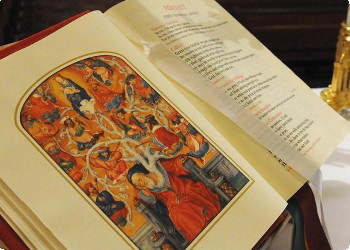He will baptize you with the holy Spirit and fire
16 DECEMBER (Lk 3,10-18)
The morality that John the Baptist suggests is simple and it is for those who have not been baptized in the Holy Spirit and fire, yet. It is a basic, fundamental and essential morality, of a man who still lives without the grace and truth of Jesus Christ: The Old Testament teaches the children of Israel a much higher morality.
My son, rob not the poor man of his livelihood; force not the eyes of the needy to turn away. A hungry man grieve not, a needy man anger not; Do not exasperate the downtrodden; delay not to give to the needy. A beggar in distress do not reject; avert not your face from the poor. From the needy turn not your eyes, give no man reason to curse you; For if in the bitterness of his soul he curse you, his Creator will hear his prayer. Endear yourself to the assembly; before a ruler bow your head. Give a hearing to the poor man, and return his greeting with courtesy; Deliver the oppressed from the hand of the oppressor; let not justice be repugnant to you. To the fatherless be as a father, and help their mother as a husband would; Thus will you be like a son to the Most High, and he will be more tender to you than a mother. Use your time well; guard yourself from evil, and bring upon yourself no shame. There is a sense of shame laden with guilt, and a shame that merits honor and respect. Show no favoritism to your own discredit; let no one intimidate you to your own downfall. Refrain not from speaking at the proper time, and hide not away your wisdom; For it is through speech that wisdom becomes known, and knowledge through the tongue’s rejoinder. Never gainsay the truth, and struggle not against the rushing stream. Be not ashamed to acknowledge your guilt, but of your ignorance rather be ashamed. Do not abase yourself before an impious man, nor refuse to do so before rulers. Even to the death fight for truth, and the Lord your God will battle for you. Be not surly in your speech, nor lazy and slack in your deeds. Be not a lion at home, nor sly and suspicious at work. Let not your hand be open to receive and clenched when it is time to give. (Cf. Sir 4,1-31).
This of John being a universal morality starts from the first rudiments, just as they are written in the conscience. This is the great characteristic of the true prophets. They never start from a perfect, ultimate and evangelical morality. They begin from the consciences of those who are before them, and then gradually lead the person to the possession of all the virtues. This is a long, endless journey, which is never exhausted and every day is always new. The rule of John the Baptist must always be applied, never be neglected, never skipped and never forgotten. It is a true rule of life.
And the crowds asked him, “What then should we do?” He said to them in reply, “Whoever has two cloaks should share with the person who has none. And whoever has food should do likewise.” Even tax collectors came to be baptized and they said to him, “Teacher, what should we do?” He answered them, “Stop collecting more than what is prescribed.” Soldiers also asked him, “And what is it that we should do?” He told them, “Do not practice extortion, do not falsely accuse anyone, and be satisfied with your wages.” Now the people were filled with expectation, and all were asking in their hearts whether John might be the Messiah. John answered them all, saying, “I am baptizing you with water, but one mightier than I is coming. I am not worthy to loosen the thongs of his sandals. He will baptize you with the holy Spirit and fire. His winnowing fan is in his hand to clear his threshing floor and to gather the wheat into his barn, but the chaff he will burn with unquenchable fire.” Exhorting them in many other ways, he preached good news to the people.
The mission of John the Baptist did not consist in proclaiming the Gospel. It was intended to prepare hearts to receive the Lord Jesus. He had to make the bridegroom meet with the bride. For this the conversion of heart, the availability of mind to be open to the Lord who is coming were necessary. Then it will be the Bridegroom to form souls without spot nor wrinkles, as it is taught by St Paul to the Ephesians.
Husbands, love your wives, even as Christ loved the church and handed himself over for her to sanctify her, cleansing her by the bath of water with the word, that he might present to himself the church in splendor, without spot or wrinkle or any such thing, that she might be holy and without blemish” (Eph. 5,25-33).
Being able to give the truth to souls is true wisdom, drawn from the Holy Spirit.
Virgin Mary, Mother of the Redemption, Angels and Saints, give us the science of the prophets.





